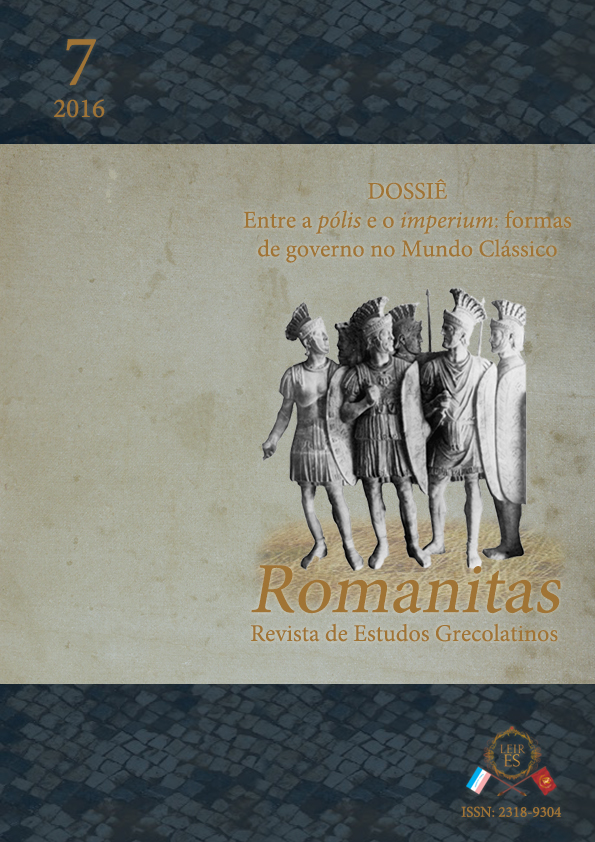The world of the polis: reflections on the Athenian model and the crisis in the territory of the poleis in the fourth century BC
DOI:
https://doi.org/10.17648/rom.v0i7.14518Keywords:
Polis, Peloponnesian War, Destructuring, Macedonia, CosmopolisAbstract
Derived from the Greek word polis, meaning city, the adjective poliade, used to describe the political system that emerged in Greece around the eighth century BC, defines the territory that became known as Hellas, and entered into a process of disintegration from the end of the fifth century BC. Our goal in this article is to outline in general terms the nature of this particular type of state which was the Greek city at the same time we seek to examine the elements that led to the breakdown of this system, as the Peloponnesian War and the rise of Macedonia as a political and military power, factors that contributed in some way for further reflection on polis and basileia. Because most of the information about the Greek politeia comes from Athens and the sources consulted in this work are of Athenian origin, we develop our reflections based on such polis.
Downloads
References
Documentação textual
ARISTÓTELES. Política. Tradução de Roberto Leal Ferreira. Rio de Janeiro: Martins Fontes, 2006.
DEMOSTHENES. Orations: olynthiacs, philippics, minor public orations. Translated by J. H. Vince. London: Loeb Cassical Library, 1998.
ISÓCRATES. Discursos histórico-políticos. Traduccíon por A. R. Romanillos. Buenos Aires: Espasa-Calpe, 1944.
ISOCRATES. Panegyricus. Translated by G. Norlin. London: Harvard University Press, 1961.
PLATÃO. Górgias. Tradução de C. A. Nunes. Pará: UFBA, 2002.
XENOFONTE. Memoráveis. Tradução de A. E. Pinheiro. Coimbra: Centro de estudos Clássicos e Humanísticos, 2008.
Obras de apoio
ANDRÉ, A. A crise do sistema políade: a redefinição da identidade ateniense nos discursos de Isócrates e Demóstenes (séc. V e IV a.C.). 2009. Dissertação (Mestrado em História) – Programa de Pós-Graduação em História, Universidade Federal do Espírito Santo, Vitória, 2009.
ARENDT, H. A condição humana. Rio de Janeiro: Forense, 2007.
BUCKLEY, T. Aspects of Greek history: 750-323 B.C. London: Routledge, 1996.
CANFORA, L. O cidadão. In: VERNANT, J. (Org.). O homem grego. Lisboa: Presença, 1994, p. 105-129.
CARDOSO, C. F. A cidade-Estado antiga. São Paulo: Ática, 1985.
CLASTRES, P. A sociedade contra o Estado. Rio de Janeiro: Francisco Alves, 1989.
FAYE, J. Demagogia. In: ROMANO, R. (Org). Einaudi: política/tolerância/intolerância. Lisboa: Imprensa Nacional-Casa da moeda, 1996, p. 231-245. v. 22.
FINLEY, M. I. Os gregos antigos. Lisboa: Edições 70, 1988a.
FINLEY, M. I. Democracia antiga e moderna. Rio de Janeiro: Graal, 1988b.
GUARINELLO, N. L. Imperialismo greco-romano. São Paulo: Ática, 1987.
HAMMOND, N. G. L. The Macedonian State: origins, institutions, and history. Oxford: Claredon Press, 2001.
JAEGER, W. Paideia: a formação do homem grego. São Paulo: Martins Fontes, 2013.
LIMA, A. C. C. Os conflitos sociais gerados pelas hetaireíai nos simpósios em Atenas no final do V século a.C. Phoînix, ano 4, p. 17-23, 1998.
LONDEY, P. Philip II and the Delphic Amphiktony. Meditarch, v. 7, p. 25-34, 1994.
MOMIGLIANO, A. Philippe de Macédoine: essai sur l’ histoire grecque du IV siècle av. J.-C. Milano: L’ Éclat, 1992.
MOSSÉ, C. Atenas: a história de uma democracia. Brasília: Editora da UNB, 1997.
MOSSÉ, C. As instituições gregas. Lisboa: Edições 70, 1985.
MOSSÉ, C. Histoire des doctrines politiques en Grèce. Paris: PUF, 1975.
PLÁCIDO SÚAREZ, D. Las formas del poder personal: la monarquia, la realeza y la tirania. Gérion, 25, n. 1, p. 127-166, 2007.
REALE, G. História da filosofia: Antiguidade e Idade Média. São Paulo: Loyola, 2003.
ROBERT, F. A literatura grega. São Paulo: Martins Fontes, 1987.
ROCHA, M. C. C. F. A palavra como prática política na democracia ateniense. Phoînix, n. 1, p. 115-121, 1995.
ROSTOVZEFF, M. História social y económica del mundo helenístico. Madrid: Espasa-Calpe, 1967.
SOUZA, M. A. P. O estrangeiro e o bárbaro na Grécia antiga: a questão da alteridade. In: FÉLIX, L. O.; GOETTEMS, M. B. (Org.). Cultura grega clássica. Porto Alegre: Ed. UFRGS, 1988, p. 55-68.
THÉBERT, I. Reflexão sobre a utilização do conceito de estrangeiro: evolução e função da imagem do bárbaro em Atenas na época clássica. Diógenes, v. 9, p. 17-33, 1987.
THEML, N. A realeza dos macedônios (VIII E VII a.C.): uma história do outro. Tese (Doutorado em História) – Programa de Pós-Graduação em História, Universidade Federal Fluminense, Niterói, 1993.
VECA, S. Política. In: ROMANO, R. (Org.). Einaudi: Política/tolerância/intolerância. Lisboa: Imprensa Nacional-Casa da moeda, 1996, p. 11-35. v. 22.
VIDAL, G. R. Procedimentos de la argumentación retórica de Antifonte a Quintiliano. Habis, v. 29, p. 37-50, 1998.
Downloads
Published
How to Cite
Issue
Section
License
Copyright (c) 2016 Romanitas - Revista de Estudos Grecolatinos

This work is licensed under a Creative Commons Attribution-NonCommercial-NoDerivatives 4.0 International License.
a. The authors retain copyright and grant the journal the right to first publication.
b. The authors are authorized to assume additional contracts separately, for non-exclusive distribution of the version of the work published in this journal (e.g., publishing in institutional repository or as a book chapter), with acknowledgment of authorship and initial publication in this journal.
c. Authors are allowed and encouraged to publish and distribute their work online (e.g. in institutional repositories or on their personal page) after the first publication by the journal, with due credit.
d. The journal's texts are licensed under a CC BY 4.0 Deed Attribution 4.0 International Licence (CC BY).




























